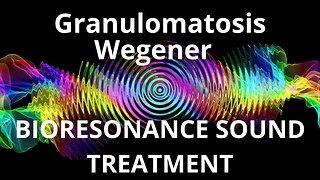Premium Only Content

Insomnia_Sound therapy session_Sounds of nature
#bioresonance #healingenergy #healingfrequencies #resonantfrequencytherapy, #insomnia, #complementarytreatment, #traditionalmedicine, #soundtherapy, #sleepdisorders, #integrativemedicine
Insomnia, a common sleep disorder, affects millions of people worldwide. While traditional medicine offers various treatment options, there is a growing interest in complementary therapies like resonant frequency sound therapy. This article delves into the benefits of incorporating resonant frequency sound therapy as an adjunctive treatment for insomnia in combination with traditional medicine.
Insomnia is characterized by difficulty falling asleep, staying asleep, or experiencing non-restorative sleep. Factors such as stress, anxiety, lifestyle, and medical conditions contribute to its development. Traditional medicine approaches include medications, cognitive-behavioral therapy, and sleep hygiene practices. However, complementary therapies like resonant frequency sound therapy can offer additional support.
Resonant frequency sound therapy involves the use of specific sound frequencies to induce a state of relaxation and promote better sleep. It harnesses the power of sound vibrations to stimulate the body's natural healing mechanisms. By using specialized sound instruments or guided audio recordings, resonant frequency sound therapy aims to restore balance and harmony in the body.
Benefits of Resonant Frequency Sound Therapy for Insomnia:
a. Deep Relaxation: The soothing sounds and vibrations generated during resonant frequency sound therapy induce a deep state of relaxation, calming the mind and body. This relaxation response can help alleviate the anxiety and tension that often accompany insomnia, making it easier to fall asleep.
b. Stress Reduction: Chronic stress is a significant contributor to insomnia. Resonant frequency sound therapy has shown promising results in reducing stress levels by promoting the release of endorphins and decreasing the production of stress hormones. By reducing stress, this therapy can create a conducive environment for better sleep.
c. Improved Sleep Quality: Resonant frequency sound therapy aids in creating a conducive sleep environment by promoting a sense of tranquility and serenity. It can enhance sleep quality by reducing interruptions, decreasing sleep latency, and increasing the duration of deep, restorative sleep.
d. Enhancing Mind-Body Connection: Resonant frequency sound therapy facilitates the alignment of mind and body, promoting a sense of harmony. This connection can help individuals with insomnia better understand and address the underlying emotional and psychological factors contributing to their sleep difficulties.
Resonant frequency sound therapy should be seen as a complementary treatment to traditional medicine approaches for insomnia. It can be used in conjunction with medications, therapy, and sleep hygiene practices. Integrating resonant frequency sound therapy into a comprehensive treatment plan allows for a holistic approach to addressing the root causes of insomnia.
Conclusion:
Resonant frequency sound therapy offers a promising adjunctive treatment option for individuals struggling with insomnia. By harnessing the power of sound vibrations, this therapy promotes relaxation, reduces stress, improves sleep quality, and enhances the mind-body connection. When used in combination with traditional medicine approaches, resonant frequency sound therapy can provide a holistic and comprehensive approach to managing insomnia and promoting better sleep.
TO ACHIEVE A POSITIVE RESULT, DAILY LISTENING TO VIDEOS IS REQUIRED.
In my store you can purchase unique medicines:
https://store11998180.company.site/
You have the opportunity to support the channel:
https://destream.net/live/RadSiarAl/donate
-
 30:00
30:00
BIORESONANCE SOUND THERAPY
7 days agoGranulomatosis Wegener _ Sound therapy session _ Sounds of nature
58 -
 LIVE
LIVE
LethalPnda
2 hours agoLocked & Loaded! 🔥 Fate Trigger Beta #RazerCreator #SpacePanda @Mystivis
65 watching -
 LIVE
LIVE
BigDaddySlick78's Live Gaming Channel
2 hours ago💰I Pay You To Play Call of Duty Warzone Rebirth Island LIVE #callofduty #warzone #cod #gaming
42 watching -
 1:59:43
1:59:43
Side Scrollers Podcast
2 days agoRIP Hulk Hogan + Payment Processor CENSORSHIP Has Officially Begun + More | Side Scrollers
174K13 -
 LIVE
LIVE
Lofi Girl
2 years agoSynthwave Radio 🌌 - beats to chill/game to
297 watching -
 1:56:31
1:56:31
The Pascal Show
19 hours ago $6.35 earnedGHISLAINE FLIPS?! DOJ Receives SECRET LIST of 100 Epstein Associates!”
17.4K7 -
 10:17
10:17
Dr Disrespect
11 days agoIt's Time To Get Serious
186K31 -
 2:15:09
2:15:09
Badlands Media
1 day agoDevolution Power Hour Ep. 375: Obama’s Orders, Ukraine’s Collapse & the Inversion of Justice
309K122 -
 2:32:03
2:32:03
BlackDiamondGunsandGear
15 hours agoAFTER HOURS ARMORY w/ DLD & John from GOA & FLR
35.6K8 -
 1:05:28
1:05:28
Man in America
16 hours agoTREASON? Obama, Hillary, and Soros in the New World Order Agenda EXPOSED w/ Mel K
103K91